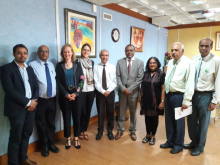Strategizing Health Policy and Sector Strategy Plan Development in Mauritius through Participatory Approach
Synchronizing the different plans in view of linking them with the Mauritius Vision 2030 on Health and Quality of Life, WHO Global Programme of Work (GPW13) and WHO Country Cooperation Strategy (CCS) is a priority action to achieve national and global health outcomes, one of which is the reduction in the prevalence of Non-communicable Diseases and their risk factors. As a matter of fact, the prevalence of NCDs mainly diabetes, hypertension, cardiovascular diseases, cancer and respiratory diseases has increased over the past four decades. NCDs account for 85% of disease burden and 81% of mortality in 2015 in the country.
In this context, the World Health Organization (WHO) is collaborating with the Ministry of Health and Quality of Life Mauritius to elaborate two keys policy documents, namely the Health Sector Strategic Plan (HSSP) 2019-2023 and the integrated strategy for prevention and control of NCDs disease 2019-2023. As part of the initiative, the process for establishing “societal dialogue for health” and developing a roadmap was initiated to finalise the action plan for NCDs and Health Sector Strategy. Dr. Ann-Lise Guisset and Ms. Kira Johanna Koch from WHO-Headquarters Geneva facilitated activities from 20th to 28th August in Mauritius. Seeking the engagement of all stakeholders, namely patients, families and the community at large was crucial at this stage so that they are placed at the heart of the Health Sector Strategy. The participatory approach for diagnosing HSS challenges to addressing the NCD epidemic opened a window of opportunity to engage in more large scale population participation in developing the new Health Sector Strategy and the integrated NCD Action Plan. It will ensure inclusiveness and participatory approaches for all stakeholders including Government, Population, Civil society, UN agencies, media, academia, NGOs, bilateral and multilateral agencies involved in health.
Two day capacity building workshop on Societal Dialogue for health was held at the Palms Hotel from 23rd to 24th August 2018 in view of raising awareness, building capacities on citizen participation and civil society engagement for policy development and also informed the participants about the participatory approach labelled ‘societal dialogue’ and what it applies when implementing such a participative process. It also helped in identifying the issues of debate and consultation related to the review of the Health Sector Strategy 2017–2022 and the relevant modalities of a participatory approach in Mauritius. The workshop was attended by more than 40 participants representing Ministry of health, various other collaborating Ministries University of Technology Mauritius, MACOSS, NGOs Civil society organization and community leaders.
During the opening of the workshop Dr Musango highlighted the importance of the better engagement of all stakeholders in driving policy changes in health and establishing societal dialogue in Mauritius and said that “it’s important to continue to sensitize all the stakeholders on what is actually meant by societal dialogue, why is it important, when should a consultation be undertaken, who could be engaged, what are different ways of achieving it and how can it help in achieving the health related outcomes, and this is what we are going to discuss within the two days, before starting the process of the elaboration of the HSSP and the Integrated strategy for prevention and control of NCDs disease.” He also thanked MOHQL for collaborating with WHO on this important aspect of policy development and European Union for providing all the financial support through the EU/Lux/UHC Partnership project.
It is good to highlight that the WHO Country Office with the help of the technical experts from Geneva led several high level discussions with MOHQL, in particular the Honourable Minister of Health Dr Anwar Husnoo, the Senior Chief Executive and Director General Health services, on aligning and synchronizing the national health plans and policies with the Mauritius Vision 2030 and WHO 13th General Programme of Work. Discussions were also held with the working group chairman and members involved in NCD assessment and the Health Promotion Unit in order to understand the findings of the NCD assessment and policy recommendations, and the participatory process from both the population and health professionals’ perspectives. A meeting was held with the delegation of European Union to gain more understanding on support available and ways in which WHO, the Ministry of Health and Quality of Life and the Mauritius Council for Social Services (MACOSS) could collaborate with European Union to promote health.
A roadmap and timelines for National Health policy vision 2030, Health sector strategy plan 2019-2023 as well as the participatory process named the ‘Societal Dialogue Forum’ were finalized. The implementation of the next steps will reap the benefits in longer term so as to reach the target ‘health for all’ and anchor the national health sector in a written vision based on participation, analysis and evidence.



